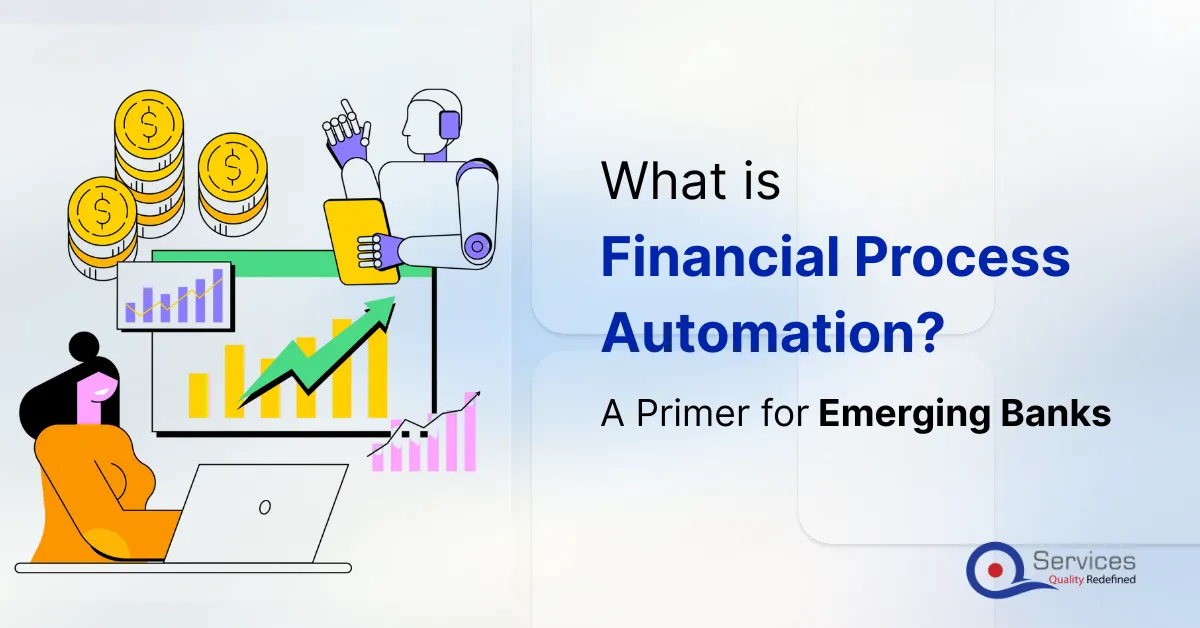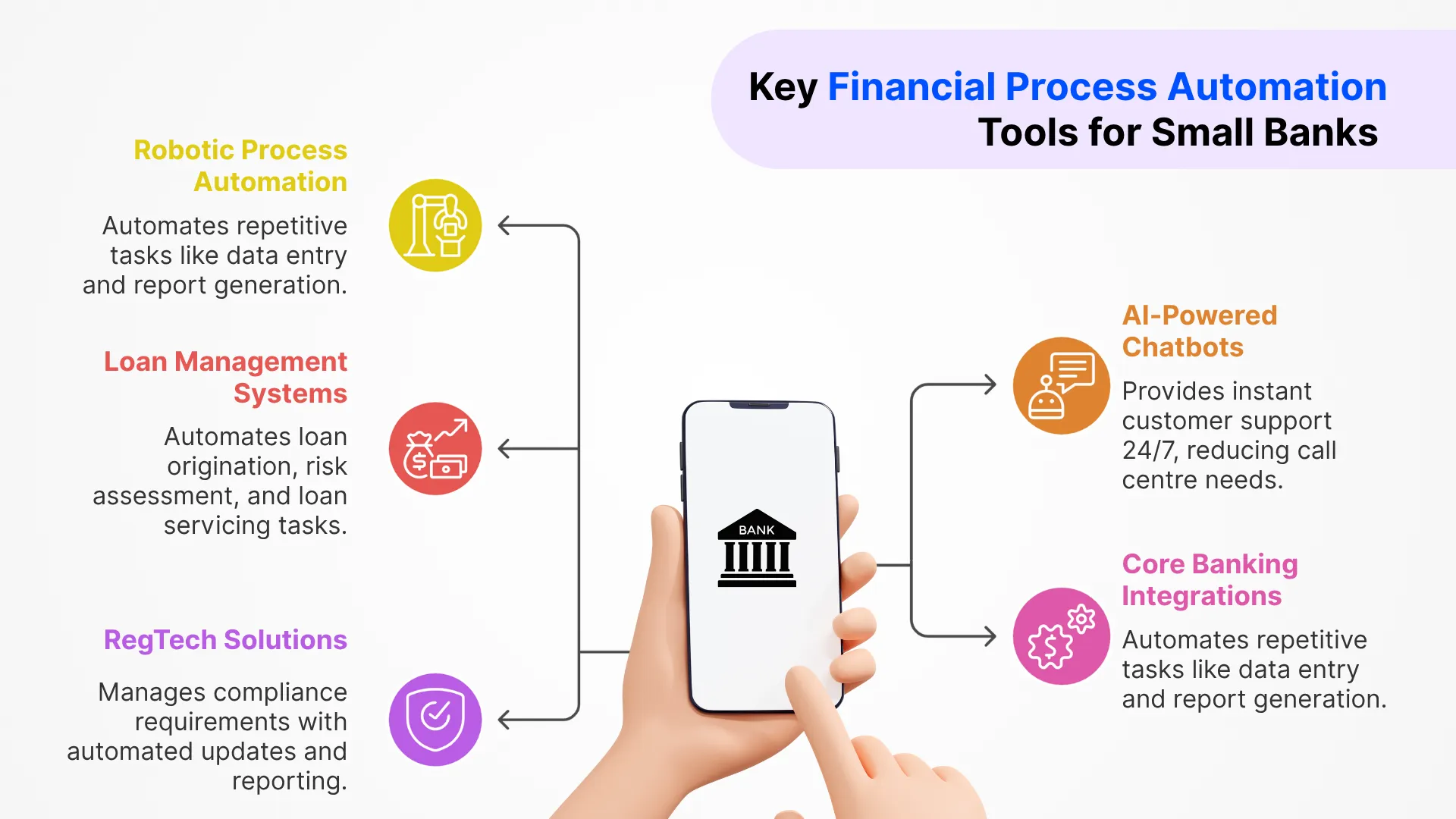
Home » What Is Financial Process Automation? A Primer for Emerging Banks

The complexity and volume of financial operations in the banking sector have reached a point where manual processes are no longer sustainable.
Most emerging banks are struggling to handle more customers, increasing financial data, and growing regulatory demands. They now need to move beyond traditional methods and adopt faster, more scalable solutions.
Financial Process Automation (FPA) is becoming an essential solution for addressing these challenges. It’s a modern solution for the finance sector that helps automate tasks using smart systems, with less need for manual work.
This blog will explain what Financial Process Automation is and why it’s a must-have solution for emerging banks.
Financial process automation means using technology, particularly Artificial Intelligence (AI), to automate finance-related tasks and reduce manual efforts banking operations.
It operates through software that recognizes patterns and follows rule-based workflows to independently complete tasks that were traditionally performed by finance teams.
Think of this solution as an intelligent computer system working on your behalf—entering data into a ledger, handling customer conversations, extracting data from emails or PDFs—all with greater accuracy.
Financial process automation in banking means a combination of speed, accuracy, and reliability.
Implementing financial process automation in banking represents a major shift in how financial services are delivered. It optimizes multiple operations within banks and enables faster workflows, reduced errors, and saves both time and costs.
Easy Big Data Analysis- Automation can analyse data from multiple sources in seconds, helping banks spot trends and revenue opportunities instantly. No manual frustration. No missed chances.
Smart Credit Underwriting- With AI-driven risk evaluation, banks can save plenty of time and ensure fair, data-driven decisions. Zero money loss risk.
Smooth Onboarding with KYC Automation- Banking automation also speeds up customer onboarding by independently verifying documents and cross-checking databases. Faster processes with fewer errors.
AI-Powered Customer Support- Customers expect fast and flexible service. Automation delivers it—with speed, personalization, and enhanced retention.
End-to-End Loan Processing– From application to verification, banking automation solutions can remove the need for manual overhead and improve the borrower’s lending experience.
Automated Compliance Processes- Advanced regulatory technology (RegTech) can autonomously manage compliance tasks, protecting banks from fines and regulatory issues.
Real-Time Fraud Detection Monitoring- Automated fraud detection keeps bank secure by spotting unusual activity the moment it happens. Advanced protection from cyber-attacks and losses.

Smaller banks often work with limited IT budgets and need solutions that deliver great operational value. Automation does everything they desire whether it’s about boosting efficiency, managing regulations, or improving customer service.
Here are some essential automation tools that banks can consider:
Robotic Process Automation (RPA): A software that automates repetitive, human-held tasks like data entry, account reconciliation, and report generation.
AI-Powered Chatbots: A tool that small banks should not ignore. It provides instant responses to customer queries and is available 24/7, reducing the need for call centre staff.
Loan Management Systems: Another key software solution with capabilities to automate loan origination, risk assessment, loan servicing, and more.
Core Banking Integrations: The backbone of automation in banking. These enable smooth data flow between departments and systems, improving transparency and decision-making.
RegTech Solutions: A technologically advanced solution that helps manage changing compliance requirements with automated updates and reporting.
Get free Consultation and let us know your project idea to turn into an amazing digital product.

Financial process automation benefits banks of all sizes, but it’s especially important for emerging banks to adopt early. It helps build a strong, scalable foundation. Its key benefits include:
Implementing business process automation in the banking industry involves several challenges, including:
System Integration Complexity: Integrating automation with legacy banking systems is challenging. Compatibility issues can disrupt workflows and increase implementation time.
Data Security & Regulations: Automated processes must meet strict data protection laws. A single vulnerability or compliance gap can lead to severe penalties and damage customer trust.
Organizational Adoption: Staff may not use automation to the fullest due to lack of training. Without strong leadership and communication, adoption rates stay low, and automation’s impact could not be effective.
High Initial Costs & Maintenance: Automation tools can be budget-shaking for small banks during the initial phase. Additionally, they require regular updates to function optimally. Ignoring maintenance can lead to inefficiencies, errors, or compliance issues.
Enabling process automation in the banking sector requires careful planning and strategic implementation. Without these, banks can run into underwhelming outcomes. Here are some best practices that can help ensure success:
Conduct a Process Audit- Banks should first review their current financial workflows to find gaps and inefficiencies. This helps identify which tasks are suitable for automation and ensures efforts are directed at the right areas.
Define the Objective of Automation: Without specific objectives, automation efforts can become misaligned with business needs. Banks should outline what they aim to achieve—whether it’s faster transaction processing or better customer service.
Choose Relevant Automation Tool: Considering your banking needs and security requirements, choose solutions that are cloud-based and serve your expectations, whether its robotic process automation in banking or
Invest in Staff Training: Automation works best when employees know how to use it effectively. Training helps teams understand the tools and get the most value from them.
Hire Process Automation Experts : Partnering with automation specialists like QServices can help banks set up, integrate, and manage automation with less risk. They also support smooth implementation, even with older systems.
Share your project idea with us. Together, we’ll transform your vision into an exceptional digital product!

Financial automation is the future of the banking industry. From small, emerging banks to large commercial institutions, this technology can optimize critical processes across all operational levels.
The demand for Robotic Process Automation (RPA) in finance is rising rapidly, with a projected compound annual growth rate (CAGR) of 25.5%. Nearly one in three financial institutions has already begun integrating automation into their operations.
Don’t let your organization miss the opportunity to grow and innovate. Let QServices help you drive efficiency through intelligent automation.
Financial process automation uses AI and software to automate repetitive finance tasks, improving accuracy and speeding up operations within banks.
Emerging banks gain faster workflows, lower costs, improved accuracy, enhanced customer service, and better regulatory compliance through automation.
Tasks like data entry, loan processing, KYC verification, fraud detection, report generation, and customer support are commonly automated.
Key technologies include Robotic Process Automation (RPA), Artificial Intelligence (AI), Machine Learning, and RegTech solutions.
Automation applies consistent rules, generates audit-ready reports, and updates compliance processes automatically to reduce regulatory risks.
No, it reduces manual workload, allowing employees to focus on higher-value tasks and better customer interactions.
Yes, risks include data security vulnerabilities, system integration challenges, and potential resistance from staff.
Common challenges include high initial costs, integrating with legacy systems, training employees, and ensuring data security.
RegTech automates regulatory compliance tasks, helping banks stay updated with laws and avoid fines.
Providing comprehensive training, clear communication, and leadership support fosters employee engagement and proper tool usage.

Have a one on one discussion with our Expert Panel

Every bank today is trying to do more with the same teams. Customer emails are increasing, compliance checks are getting stricter, and service expectations are becoming instant. Yet most internal processes still depend on manual steps. Employees move data from one screen to another, verify documents by hand, and follow long approval chains.

Many enterprise teams treat identity and access as if they are the same thing. They aren’t. Identity confirms who a user is. Access defines what that user is allowed to do. Assuming that an authenticated identity automatically deserves access is one of the most common—and costly organizational security mistakes.

Most enterprises did not choose to be here. Core systems were built to be stable, not adaptable. Over time, layers of customization, integrations, and workarounds turned reliability into rigidity. Today, every new digital initiative feels harder than it should be.

Founder and CEO

Chief Sales Officer
